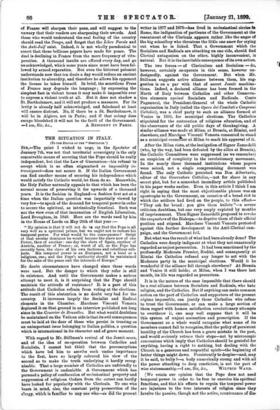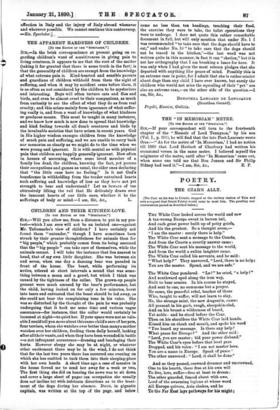THE SITUATION IN ITALY. [To TIM EDITOR OF TEL SPECTATOR.1
Sin,--The point I wished to urge, in the Spectator of January 7th, was not that territorial sovereignty is the only conceivable means of securing that the Pope should be really independent, but that the Law of Guarantees—his refusal to
accept which is so often stigmatised as impossibly in- transigeant—does not secure it. If the Italian Government
can find another means of securing his independence which would satisfy the Catholic world, let them do so. Meanwhile, the Holy Father naturally appeals to that which has been the normal means of preserving it for upwards of a thousand years. It is the fashion in England—a fashion first set at a time when the Italian question was impartially viewed by very few—to speak of the demand for temporal power in order to secure the spiritual, as intrinsically fanatical. Such was not the view even of that incarnation of English Liberalism, Lord Brougham, in 1849. Here are the words used by him in the House of Lords on May 20th of that year :—
" My opinion is that it will not do 10 say that the Pope is all very well as a spiritual prince, but we ought not to restore his temporal power. For what would be the consequence ? Stript of that secular dominion be would become the slave now of one Power, then of another: one day the slave of Spain, another of Austria, another of France ; or, worst of all, as the Pope has recently been, the slave of his own factious and rebellious sub- jects. His temporal power is an European, not a local or a religious, one ; and the Pope's authority should be maintained for the sake of the peace and the interests of Europe."
No doubt circumstances have changed since these words were used. Bat the danger to which they refer is still in existence. And until the Government makes a serious attempt to meet it, is it surprising that the Pope should maintain the attitude of resistance? It is a part of this attitude that Catholics refrain from voting at the elections.
The result of this abstention is no doubt very bad for the country. It increases largely the Socialist and Radical elements in the Chamber. Marchese Visconti Venosta deplored it on that ground in an interview published not long since in the Courrier de Bruxelles. But what would doubtless be maintained on the Vatican side is that its evil consequences must be laid at the door of those who persist in treating as an unimportant issue belonging to Italian politics, a question which is international in its character and of grave moment.
With regard to Mr. Stillman's revival of the Jesuit scare, and of the idea of co-operation between Catholics and Socialists, I cannot but think that the preconceptions which have led him to ascribe such undue importance
to the first, have so largely coloured his view of the second as to make the truth underlying it hardly recog- nisable. That a large number of Catholics are unfriendly to the Government is undeniable. A Government which has pursued a policy of confiscation of ecclesiastical property and suppression of religious Orders from the outset can hardly have looked for popularity with the Clericals. To one who bears in mind, also, the constant petty persecution of the clergy, which is familiar to any one who—as did the present
writer in 1877 and 1878—has lived in ecclesiastical circles in Rome, the indignation of partisans of the Government at the resentment of the Clericals__ _appears rather like the anger of the big schoolboy who threatens the little one anew for crying out when he is licked. That a Government which the Socialists and Radicals are attacking on one side, should find Clerical antagonism on the other, highly inconvenient, is natural. But it is the inevitable consequence of its own action.
The two forces — of Clericalism and Socialism — do, however, certainly co-operate in this sense, however un- designedly, against the Government. But when Mr. Stillman suggests active alliance between them, his sug. gestion is on a par with that of secret Jesuit machina- tions. Indeed, a declared alliance has been formed in the North of Italy between Catholics and other Conserva- tive elements against Socialists and Radicals. Conte Paganuzzi, the President-General of the whole Catholic organisation in Italy (called the Opera dei Comitati e Congressi Cattolici), was a chief party to such an alliance formed at Venice in 1895, for municipal elections. The Catholics stipulated for the restoration of religious education, and of the observance of the old public days of thanksgiving. A similar alliance was made at Milan, at Brescia, at Rimini, and elsewhere, and Marchsse Visconti Venosta consented to stand as a municipal councilor at Milan to mark his approval of it.
After the Milan riots, at the instigation of Signor Zanardelli (who, by the way, had been defeated by the allies at Brescia), the Catholic Committees were suppressed (as we remember) on suspicion of complicity in the revolutionary movement. In the nearly three thousand institutions whose papers were seized, not a single compromising document was found. The only Catholic punished was Don Albertario, editor of the Osservatore Cattolico,—not for share in any secret plot, but for a somewhat incendiary article published in his paper weeks earlier. Even in this article I think I am right in saying that the most objectionable phrase was an apostrophe to the Government, on occasion of a bread riot in which the soldiers had fired on the people, to this effect- " They ask for bread : you give them bullets "—a severe criticism doubtless, but one very amply expiated by months of imprisonment. Then Signor Zanardelli proposed to revoke the exequaturs of the Bishops,—to deprive them of their official position and stipend. Marchese Visconti Venosta protested against this further development in the Anti-Clerical cam- paign, and the Government fell.
But what was the result of what had been already done P The Catholics were deeply indignant at what they not unnaturally regarded as unjust persecution. It had been sanctioned by the professedly Moderate Premier, Rudini, and consequently at Rimini the Catholics refused any longer to act with the Moderate party in the municipal elections. Would it be wonderful if the alliance fell through elsewhere? At Brescia and Venice it still holds; at Milan, when I was there last month, its life was regarded as precarious.
It is in the nature of the case impossible that there should be a real alliance between Socialists and Radicals, who hate religion, and the Catholics. But if anything can make common action on the part of Catholics and supporters of the present regime impossible, can justify those Catholics who refuse to trust the Government, or can make a large section of them regard with human satisfaction revolutionary attempts to overthrow it, one may well suppose that it will be this system of unjust accusation and proscription. If the Government as a whole would recognise what some of its members cannot fail to recognise, that the policy of persistent hostility of the Church has been a grave mistake in the past, and would seriously retrace their steps—not by microscopic concessions which imply that Catholics should be grateful for anything, having a right to nothing, but dealing with the Church in a generous and respectful spirit—the beginning of better things might dawn. Persistently to despise—and, may it be said, to bully ?—a body numerically strong and with all the power attaching to deep conviction, is not the part of
wise statesmanship.—I am, Sir, &c., WILFRID WARD.
[We retain our opinion that the Pope does not need temporal power in order to be free to exercise his spiritual functions, and that his efforts to regain the temporal power are injurious to the true interests of religion since they involve the passive, though not the active, countenance of ills: affection in Italy and the injury of Italy abroad whenever and wherever possible. We cannot continue this controversy. Spectator.]



































 Previous page
Previous page